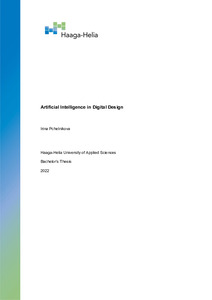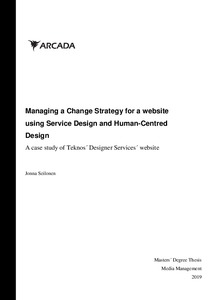Artificial Intelligence in Digital Design
Pchelnikova, Irina (2022)
Pchelnikova, Irina
2022
All rights reserved. This publication is copyrighted. You may download, display and print it for Your own personal use. Commercial use is prohibited.
Julkaisun pysyvä osoite on
https://urn.fi/URN:NBN:fi:amk-2022053012976
https://urn.fi/URN:NBN:fi:amk-2022053012976
Tiivistelmä
Being the mix of art and technology, digital design is one the most fascinating and fast-changing area of information technologies. When it comes to innovations in digital design, by using the game-changer technology Artificial Intelligence (AI) designers can create immersive digital masterpieces within seconds, having thousands of various shapes and colours to choose from. The best time for designers, isn’t it? However, some of them assume that the AI algorithm might replace designers in the future.
The aim of this research is to explore the present and future of AI in design by gathering information from various sources and providing answers to the main research question - will AI algorithm replace designers in the future?
In the theoretical part of the research the author explains the main principles of AI and its brief history and explores what AI can do in various digital design areas such as UX/UI design, websites and mobile applications, graphic design and logos, VR and 3D design. Also, the possible future trends of AI in design were explored in this part.
In the empirical part, the researcher analyses qualitative data by gathering insights from the survey, conducting expert interviews and summarising various points of views in the final discussion. The data collected from the respondents and experts was visualised using charts to make it easier to understand quickly by non-experts.
In the discussion and conclusion part the author summarizes all data collected from the respondents and the experts to provide detailed answers to the main research questions and oppose them against the theoretical part.
The results of this study valid only on the context where the author conducted survey and interview. To generalise the results, further investigation needed by collecting more responses and conducting more interviews.
The aim of this research is to explore the present and future of AI in design by gathering information from various sources and providing answers to the main research question - will AI algorithm replace designers in the future?
In the theoretical part of the research the author explains the main principles of AI and its brief history and explores what AI can do in various digital design areas such as UX/UI design, websites and mobile applications, graphic design and logos, VR and 3D design. Also, the possible future trends of AI in design were explored in this part.
In the empirical part, the researcher analyses qualitative data by gathering insights from the survey, conducting expert interviews and summarising various points of views in the final discussion. The data collected from the respondents and experts was visualised using charts to make it easier to understand quickly by non-experts.
In the discussion and conclusion part the author summarizes all data collected from the respondents and the experts to provide detailed answers to the main research questions and oppose them against the theoretical part.
The results of this study valid only on the context where the author conducted survey and interview. To generalise the results, further investigation needed by collecting more responses and conducting more interviews.
Kokoelmat
Samankaltainen aineisto
Näytetään aineisto, joilla on samankaltaisia nimekkeitä, tekijöitä tai asiasanoja.
-
Managing a Change Strategy for a website using Service Design and Human-Centred Design : A case study of Teknos´ Designer Services´ website
Seilonen, Jonna (2019)This study is based on the website service development. It analyses how a change strategy may be managed for a website based on user preferences and recommendations. The aim of the study is to provide recommendations as ... -
Personal experiences in the design process : how designers recognize and utilize their personal experiences in the design process
Tiensivu, Maaria (Turun ammattikorkeakoulu, 2016)The thesis explores how designers utilize and reflect on their personal experiences within the design process. It tackles the reasons why these experiences should not be automatically rejected as biased and why critical ... -
Design in Games : game design and how does design affect the perception of the game?
Poryadina, Daria (2022)Game design is a very important part of the game development process. Creation of game content, bringing it into technical compliance. The study of the features of game design and its impact on the perception of the player ...



